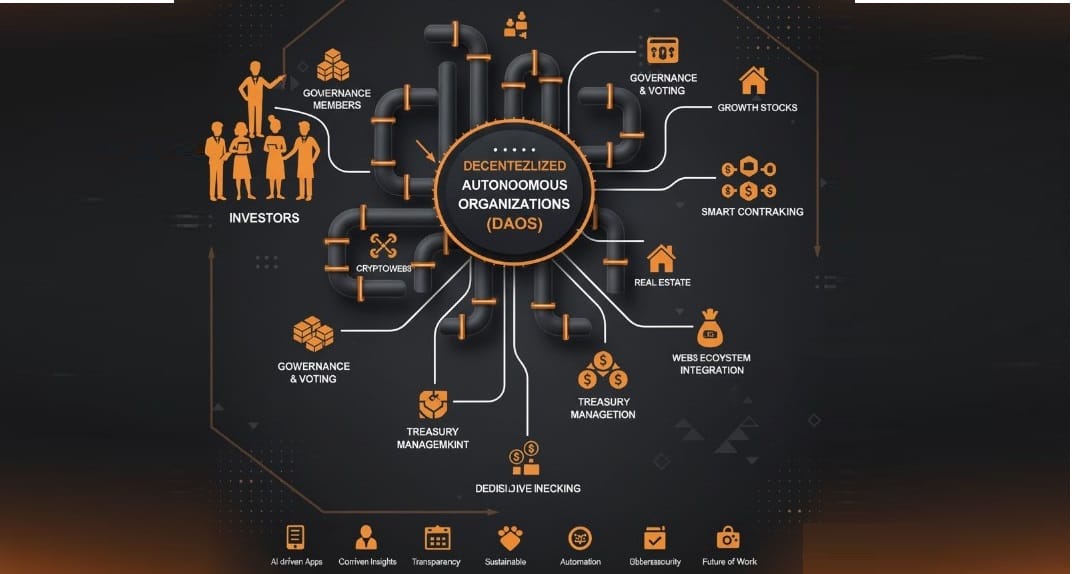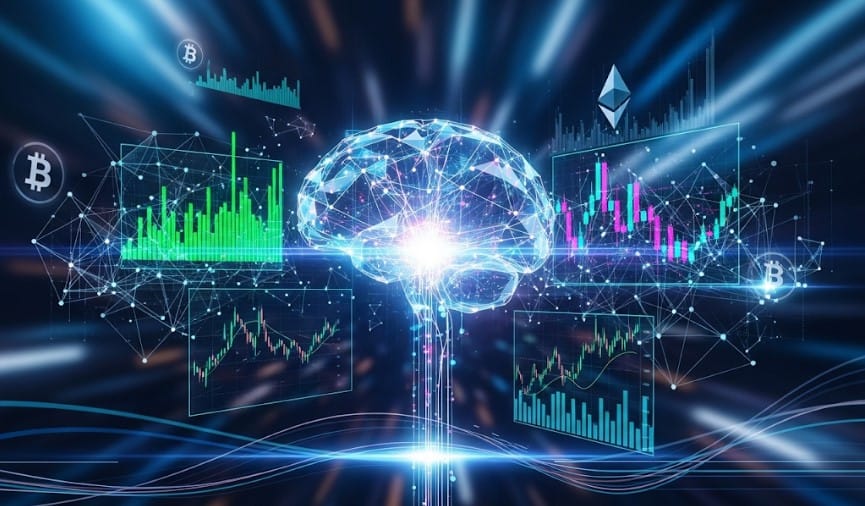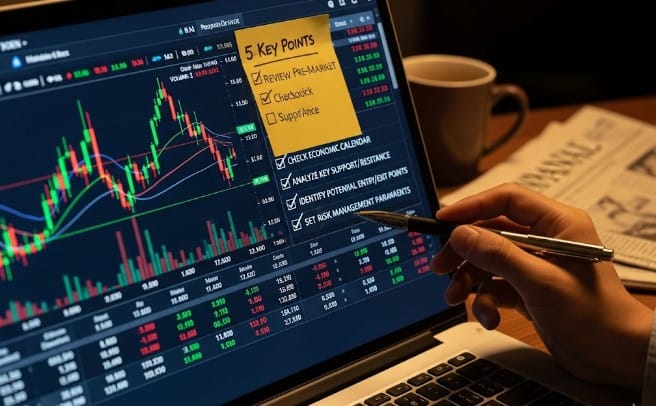Introduction
As the world continues to shift toward decentralized technology, few innovations have generated as much intrigue as Decentralized Autonomous Organizations (DAOs).
DAOs are revolutionizing how people organize, collaborate, and make decisions online — without the need for centralized authorities or traditional management.
Built on blockchain technology and smart contracts, DAOs represent a new model of governance that is transparent, democratic, and community-driven.
From finance and gaming to philanthropy and media, DAOs are reshaping the foundation of organizational trust in the digital era.
1. What Is a DAO?
A Decentralized Autonomous Organization (DAO) is a blockchain-based entity governed by smart contracts rather than by individuals or institutions.
It operates according to rules encoded into software, which automatically executes decisions once community members vote and agree on proposals.
Unlike traditional organizations where a board or CEO makes decisions, DAOs distribute power to token holders, who can submit and vote on proposals that shape the project’s direction, funding, and growth.
In essence, a DAO is:
“An organization with no central leadership — decisions are made collectively by members and executed automatically through smart contracts.”
2. The Core Components of a DAO
DAOs rely on a combination of technology, community governance, and incentive structures.
a. Smart Contracts
Smart contracts are self-executing digital agreements that carry out tasks once predefined conditions are met.
They form the backbone of a DAO by handling voting, funding, and enforcement without human intervention.
b. Governance Tokens
Each DAO issues its own tokens that grant voting power.
- Token holders can vote on new proposals
- Voting weight often depends on the number of tokens owned
- Tokens may also represent financial stake or membership rights
c. Proposals and Voting
Any member can submit a proposal—for funding, rule changes, partnerships, etc.—and the community votes.
Once approved, the smart contract executes automatically, ensuring trustless, tamper-proof decision-making.
d. Treasury and Funding
A DAO’s funds are stored in a multi-signature or smart contract-based wallet, only accessible through community-approved votes.
This eliminates misuse of funds and ensures transparency in every transaction.
3. Why DAOs Matter: The Power of Decentralized Governance
The emergence of DAOs marks a fundamental shift in organizational philosophy.
Instead of trusting institutions, people now trust open-source code and transparent blockchain systems.
a. Transparency
Every transaction, vote, and rule is visible on-chain.
This ensures full accountability and eliminates behind-the-scenes manipulation.
b. Global Collaboration
DAOs enable borderless participation, allowing individuals worldwide to collaborate, invest, and build together regardless of location or background.
c. Community Ownership
Members are not just users—they are stakeholders with direct influence over decision-making and rewards.
d. Efficiency and Automation
DAOs reduce bureaucracy through automation, enabling faster execution of community-approved initiatives.
e. Innovation and Experimentation
With open participation and code-based trust, DAOs foster rapid innovation, testing new governance models in real-time.
4. Real-World Examples of Successful DAOs
Several DAOs have become industry leaders, proving the model’s scalability and success.
1. MakerDAO
One of the earliest and most influential DAOs, MakerDAO governs the DAI stablecoin on Ethereum.
Members vote on collateral types, stability fees, and system upgrades — making it one of the best examples of decentralized financial governance.
2. Uniswap DAO
The Uniswap decentralized exchange (DEX) empowers token holders to make decisions about platform updates, liquidity incentives, and governance parameters.
3. Aave DAO
Aave’s DAO oversees the world’s leading decentralized lending protocol, managing billions in liquidity.
Token holders determine risk parameters, interest models, and cross-chain integrations.
4. PleasrDAO
An innovative art collective that pools resources to purchase high-value NFTs and digital art pieces.
It demonstrates how DAOs can drive collective investment and creativity.
5. Decentraland DAO
Decentraland’s metaverse economy is governed by its DAO, which controls land policy, marketplace rules, and virtual governance.
5. The Economics of DAOs: Tokenomics and Incentives
The success of any DAO depends on well-designed tokenomics that align incentives across all members.
Token Utility Includes:
- Voting Rights: Influence on key governance decisions
- Staking Rewards: Incentivizing long-term participation
- Access Privileges: Entry to exclusive DAO features or benefits
- Revenue Sharing: Distribution of profits or treasury earnings
This creates a self-sustaining economic model, where token holders benefit from both the success and governance of the ecosystem.
6. Challenges Facing DAOs
While DAOs represent the future of governance, they’re not without challenges.
a. Legal Uncertainty
DAOs exist in a gray area. Most countries lack a legal framework to recognize them as entities.
Some regions, like Wyoming (USA) and Switzerland, have introduced laws to integrate DAOs into existing business structures.
b. Security and Smart Contract Risks
Smart contracts can be exploited if not properly audited.
A single vulnerability can lead to massive financial losses, as seen in early DAO hacks.
c. Voter Apathy
Despite being democratic, many DAOs suffer from low participation rates—only a small fraction of token holders actively vote.
d. Governance Capture
Large token holders can dominate votes, creating centralized influence within supposedly decentralized systems.
e. Coordination Complexity
As DAOs grow, reaching consensus among thousands of members becomes increasingly difficult.
7. DAOs and AI: The Next Evolution
The next frontier of DAOs may involve AI integration, enabling autonomous proposal evaluation, decision analysis, and smart resource allocation.
AI-powered DAOs could:
- Analyze proposal outcomes before execution
- Predict financial risks and optimize treasury management
- Enable real-time performance tracking
- Enhance community engagement using machine learning insights
This synergy between AI and blockchain could transform DAOs from simple governance systems into intelligent, self-optimizing digital organizations.
8. The Future Outlook: DAOs in 2025 and Beyond
DAOs are expanding beyond DeFi and NFTs, entering sectors like:
- Media & Journalism: Decentralized news cooperatives (e.g., Mirror DAO)
- Philanthropy: Transparent charity funding and tracking
- Gaming: Player-owned economies and governance systems (e.g., gaming guild DAOs)
- Corporate Governance: Companies experimenting with hybrid DAO structures for employees and shareholders
By 2025, DAOs could play a central role in redefining governance models across industries, offering a blueprint for community-led innovation.
9. How to Join or Create a DAO
Anyone can participate in or even launch a DAO. Here’s how:
Joining a DAO
- Choose a niche — DeFi, art, gaming, or social impact
- Acquire the DAO’s governance token
- Join its community channels (Discord, forums, etc.)
- Vote on proposals or contribute to projects
Creating a DAO
- Use platforms like Aragon, DAOstack, or Gnosis Safe
- Define a mission, governance rules, and tokenomics
- Deploy smart contracts on Ethereum, Polygon, or other EVM chains
- Attract members and bootstrap funding
10. Conclusion
Decentralized Autonomous Organizations (DAOs) are redefining what it means to collaborate, invest, and govern in the digital world.
By combining blockchain transparency, smart contract automation, and community-driven governance, DAOs offer a trustless and inclusive model for building the future.
While challenges remain — from regulation to participation — the momentum behind DAOs is unstoppable.
As more individuals, institutions, and developers embrace this model, DAOs will become the foundation of decentralized economies and social coordination in Web3.
The rise of DAOs signals a new age of digital democracy — one where power truly belongs to the community .


